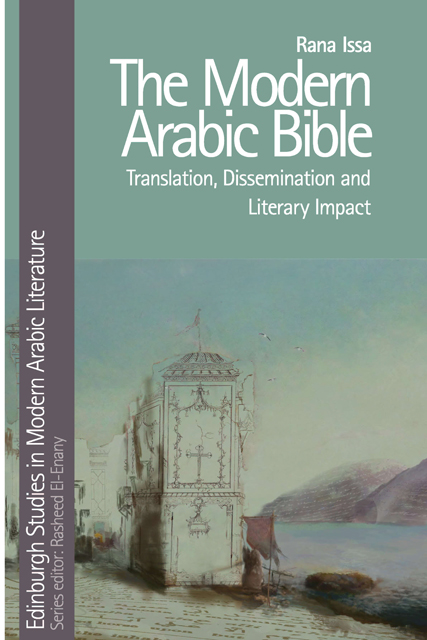Book contents
- Frontmatter
- Contents
- List of Figures
- Series Editor’s Foreword
- Acknowledgements
- Note on Transliteration and Abbreviations
- Dedication
- Introduction
- 1 The Missionary Bible
- 2 Bible Competition
- 3 Standardising Arabic
- 4 Butrus al-Bustani as Translator
- 5 Ahmad Faris Al-Shidyaq’s Bible as Literature
- Conclusion: In the Beginning was Translation
- Bibliography
- Index
1 - The Missionary Bible
Published online by Cambridge University Press: 02 June 2023
- Frontmatter
- Contents
- List of Figures
- Series Editor’s Foreword
- Acknowledgements
- Note on Transliteration and Abbreviations
- Dedication
- Introduction
- 1 The Missionary Bible
- 2 Bible Competition
- 3 Standardising Arabic
- 4 Butrus al-Bustani as Translator
- 5 Ahmad Faris Al-Shidyaq’s Bible as Literature
- Conclusion: In the Beginning was Translation
- Bibliography
- Index
Summary
A Global Perspective on the Commoditisation of the Arabic Bible
The nineteenth century marked the commoditisation of the Bible around the world. Protestant missionaries circulated the Bible and negotiated its value in various locations and across disparate cultures and religions through an unprecedented process of exchange. Choosing to travel the world to translate the Bible, they defined ‘the first object of a Protestant mission … to give the word of God to a people in their own tongue, wherein they were born, and in which the family converses at home’. This object was dependent on turning the Bible into a cheap commodity, within financial reach of most local consumers. Its economic status was steered towards a ‘situation in which its exchangeability (past, present, or future) for some other thing [became] its socially relevant feature’. American and British missionaries proselytised, translated and disseminated Bibles in a multitude of vernaculars. When these regions did not possess Bibles written in their languages (or even written languages as such), such as in New Zealand, parts of Latin America or Africa, the missionaries worked well in advance to supply those communities, sometimes with a written language and then with Bibles in local tongues. In earlier centuries, the Bible had been available in the vernaculars of European and Levantine societies. In the nineteenth century, the Bible was translated into more than ninety languages, becoming the most translated book in the world, running into several million print editions. Translating to convert, the missionaries equated the act of reading with conversion, and laboured to proliferate literacy amongst the locals. The exponential growth of Bible dissemination and publishing ‘helped seed different forms of nationalism’. In the Levant, as elsewhere, these nationalisms were fomented with feelings of sectarian exceptionalism that characterise the labour of conversion.
Languages such as Arabic, which already had a tradition of vernacular Bible translation, exhibit the historically contingent dynamics of this commoditisation. It thus becomes possible to explore precisely what changed in the nineteenth century through a diachronic comparison with versions of the Bible from earlier epochs. This chapter charts the changes in the relations of exchange that the Bible mediates (as well as occludes) when commoditisation becomes its most salient feature.
- Type
- Chapter
- Information
- The Modern Arabic BibleTranslation, Dissemination and Literary Impact, pp. 41 - 80Publisher: Edinburgh University PressPrint publication year: 2023

